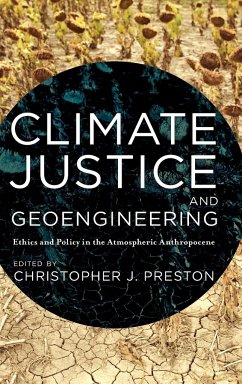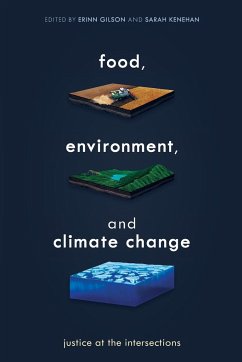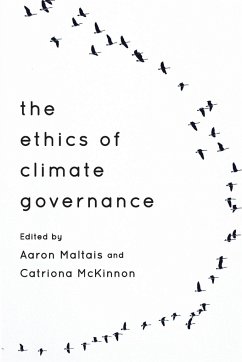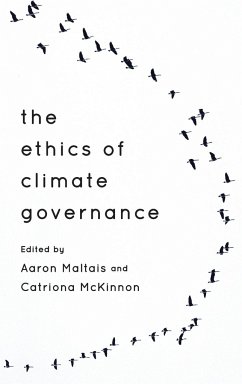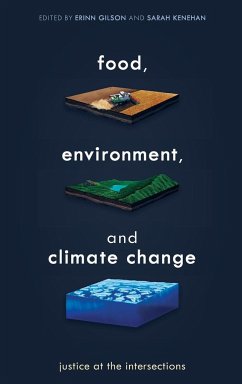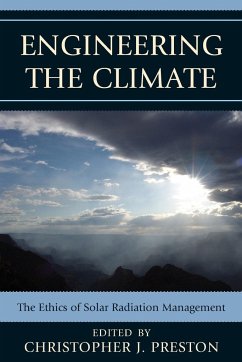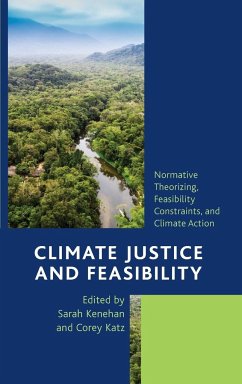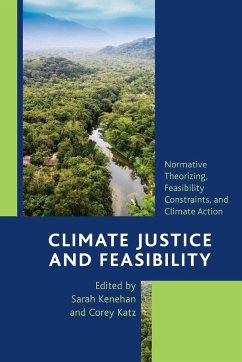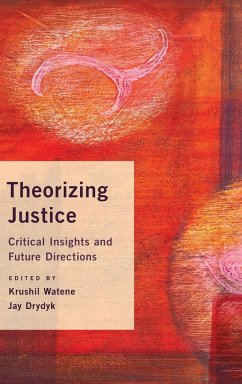Broschiertes Buch
Climate Justice and Geoengineering
Ethics and Policy in the Atmospheric Anthropocene
Herausgeber: Preston, Christopher J.
Versandkostenfrei!
Versandfertig in 1-2 Wochen
Weitere Ausgaben:

PAYBACK Punkte
27 °P sammeln!




A collection of original and innovative essays that compare the justice issues raised by climate engineering to the justice issues raised by competing approaches to solving the climate problem.
Christopher J. Preston is Professor of Philosophy and a Fellow at the Mansfield Center's Program on Ethics and Public Affairs at the University of Montana. Contributors: Christian Baatz, research assistant, Department of Philosophy, Christian-AlbrechtsUniversität, Kiel, Germany; Patrik Baard, doctoral candidate, Royal Institute of Technology, Stockholm, Sweden; Matthew Cotton, Lecturer, Department of Town and Regional Planning, University of Sheffield, UK; Johannes Emmerling, Senior Researcher in Climate Change and Sustainable Development, Fondazione Eni Enrico Mattei, Milan, Italy; Allen Habib, Assistant Professor of Philosophy, University of Calgary, Canada; Joshua Horton, Post-doctoral Research Fellow, Belfer Center for Science and International Affairs, Harvard University, USA; Marion Hourdequin, Associate Professor of Philosophy, Colorado College, USA; Frank Jankunis, doctoral student in philosophy, University of Calgary, Canada; David Keith, Gordon McKay Professor of Applied Physics and Professor of Public Policy, Kennedy School, Harvard University; Teea Kortetmäki, doctoral student, University of Jyväskylä, Finland; Penehuro Fatu Lefale, International Climate and Policy Analyst, Bodeker Scientific, Wellington, New Zealand; Jane Long, retired Principle Director at Large, Lawrence Livermore National Laboratory, Berkeley, USA, and contributing scientist for the Environmental Defence Fund; Duncan McClaren, director of McLaren Environmental Research Consultancy and Scientific Advisory Committee of the RCUK UK Energy Programme; Cush Luwesi Ngozo, Lecturer, Department of Geography, University of Kenyatta, Kenya; Konrad Ott, Professor for Philosophy and Ethics of the Environment, Kiel University, Germany; Andrew Parker, Research Fellow, Institute for Advanced Sustainability Studies, Potsdam, Germany; Tina Sikka, Postdoctoral Fellow and Lecturer, School of Communication, Simon Fraser University, Canada; Toby Svoboda, Assistant Professor of Philosophy, Fairfield University, USA; Massimo Tavoni, Fellow, Center for Advanced Studies in Behavioural Science, Stanford University, and Climate Change and Sustainable Development Deputy Coordinator, Fondazione Eni Enrico Mattei, Milan, Italy; Michael Thompson, Managing Director, Forum for Climate Engineering Assessment, School of International Service, American University, Washington DC, USA; Richard Tol, Professor of the Economics of Climate Change, Institute for Environmental Studies and Department of Spatial Economics in Vrije Universiteit, Netherlands and Professor of Economics, University of Sussex, UK; Per Wikman-Svahn, scientist, Swedish Defence Research Agency, Stockholm, Sweden
Produktdetails
- Verlag: Rowman & Littlefield Publishers
- Seitenzahl: 234
- Erscheinungstermin: 21. September 2016
- Englisch
- Abmessung: 229mm x 152mm x 14mm
- Gewicht: 387g
- ISBN-13: 9781783486373
- ISBN-10: 1783486376
- Artikelnr.: 43366296
Herstellerkennzeichnung
Libri GmbH
Europaallee 1
36244 Bad Hersfeld
gpsr@libri.de
Für dieses Produkt wurde noch keine Bewertung abgegeben. Wir würden uns sehr freuen, wenn du die erste Bewertung schreibst!
Eine Bewertung schreiben
Eine Bewertung schreiben
Andere Kunden interessierten sich für





